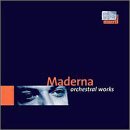| All Artists: Bruno Maderna, Swf Sym Orch Baden-Baden, Arturo Tamayo Title: Maderna: Orchestra Works Members Wishing: 0 Total Copies: 0 Label: Col Legno Release Date: 4/15/2000 Album Type: Import Genres: Pop, Classical Styles: Vocal Pop, Forms & Genres, Concertos, Historical Periods, Modern, 20th, & 21st Century, Instruments, Reeds & Winds, Symphonies Number of Discs: 1 SwapaCD Credits: 1 UPC: 675754147228 |
Search - Bruno Maderna, Swf Sym Orch Baden-Baden, Arturo Tamayo :: Maderna: Orchestra Works
 | Bruno Maderna, Swf Sym Orch Baden-Baden, Arturo Tamayo Maderna: Orchestra Works Genres: Pop, Classical
|
Larger Image |
CD Details |
CD ReviewsModernist lyricism scarecrow | Chicago, Illinois United States | 02/28/2005 (5 out of 5 stars) "Maderna was a well-loved, respected creator composer conductor.Boulez's orchestral "Rituel" is dedicated to his memory.
He initiated, instigated much in the early years in Italy,the cultural backward freeze in contemporary expression around Venice then Milan, founding with Luciano Berio, Italy's first electronic music studio. He followed the paradigm of Boulez, that the avant-garde needs more conductors not so many composers for there are too many of those. So slowly Maderna conducted all the new repertoire first at Darmstadt Summer courses,then in Italy and Germany,finally the USA,giving conducting courses at Tanglewood. Simultaneously he kept pace with composition never allowing the current issues in music to leave his pen.After an early period of elegant post-Webern-like gesturings He found the concept of the "indeterminate" to leave passages within a piece free, or to cue entrances of the musicians. He found this difficult and really never came to a fulfilling resolution to this paradigm,while others as his friends Boulez and Nono utilized live electronics and the computer with technicians. Still he left impressive works as within his final years late Seventies the orchestral "Aura", and "Quadrivium".Also here his "Giardino Religioso" where the conductor cues entrances,and joins the orchestra to play, and where tones, intervals are inscribed within boxes and brackets allowing the musician the freedom to begin wherever he-she may want. The trouble in retrospect is that most orchestral musicians(up to today;s scene I'd say) crave no such performative freedom(s) and would rather the struggling composer to simply tell them what to play. Maderna wrote numerous Concerti for Oboe,(some incomplete) ones also for English Horn,as well as numerous fascinating unaccompanied pieces for Lothar Faber. In fact this collaboration finds no equal in the number of works produced. Maderna has always had a fine sense of lyricism even within the many times coldly abstract procedures of dodecaphonic music, I beleive it was Luigi Dallapiccola, who taught this first generation in Italy that 12 Tone Music needn't be ugly brutal, overwhelming or hopeless sounding or obtuse,something Paul Virilio has said of the post-war avant-garde that you still sensed the brutality of the Second World War, that not all the wood splinters of fragmented bricks had landed;Maderna I suspect thought something else should be there and the 12 Tones can be,should be garnered into shaped beautiful lines, and this is what Maderna does here in this beautiful Oboe Concerto, He loved the threadbare,moments of clarity and sparceness, he was always looking for where the "lightness" inhabited its places and realms within a piece of music, very Italian, if not Mediterranean." |

 Track Listings (3) - Disc #1
Track Listings (3) - Disc #1